
The Student Conservation Association (SCA) is a non-profit group in the United States whose mission is to build the next generation of conservation leaders and inspire lifelong stewardship of the environment and communities by engaging young people in hands-on service to the land through service opportunities, outdoor skills, and leadership training.

Appalachian Mountain Club (AMC) is the oldest outdoor group in the United States. Created in 1876 to explore and preserve the White Mountains in New Hampshire, it has expanded throughout the northeastern U.S., with 12 chapters stretching from Maine to Washington, D.C. The AMC's 90,000 members, its advocates, and supporters mix outdoor recreation, particularly hiking and backpacking, with environmental activism. Additional activities include cross-country skiing, whitewater and flatwater canoeing and kayaking, sea kayaking, sailing, rock climbing and bicycle riding. The Club has about 2,700 volunteers, who lead roughly 7,000 trips and activities per year. The organization publishes a number of books, guides, and trail maps.
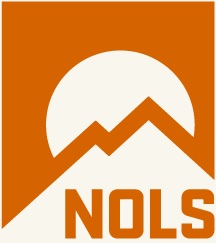
NOLS is a non-profit outdoor education school based in the United States dedicated to teaching environmental ethics, technical outdoor skills, wilderness medicine, risk management and judgment, and leadership on extended wilderness expeditions and in traditional classrooms. It was previously known as the National Outdoor Leadership School, but in 2015, this label was retired in favor of the independent "NOLS". The "NOLS" mission is to be the leading source and teacher of wilderness skills and leadership that serve people and the environment. NOLS runs courses on six continents, with courses in a variety of wilderness environments and for almost any age group. The NOLS vision is to, "elevate the leader in everyone".

The National Trails System is a series of trails in the United States designated "to promote the preservation of, public access to, travel within, and enjoyment and appreciation of the open-air, outdoor areas and historic resources of the Nation". There are four types of trails: the national scenic trails, national historic trails, national recreation trails, and connecting or side trails. The national trails provide opportunities for hiking and historic education, as well as horseback riding, biking, camping, scenic driving, water sports, and other activities. The National Trails System consists of 11 national scenic trails, 21 national historic trails, over 1,300 national recreation trails, and seven connecting and side trails, as well as one national geologic trail, with a total length of more than 91,000 mi (150,000 km). The scenic and historic trails are in every state, and Virginia and Wyoming have the most running through them, with six.

The Superior Hiking Trail, also known as the SHT, is a 310-mile (500 km) long hiking trail in northeastern Minnesota that follows the rocky ridges overlooking Lake Superior for most of its length. The trail travels through forests of birch, aspen, pine, fir, and cedar. Hikers enjoy views of boreal forests, the Sawtooth Mountains, babbling brooks, rushing waterfalls, and abundant wildlife. The lowest point in the path is 602 ft (183 m) above sea level and the highest point is 1,829 ft (557 m) above sea level. The footpath is intended for hiking only. Motorized vehicles, mountain bikes, and horses are not allowed on the trail. Many people use the trail for long-distance hiking, and facilitating this purpose are 94 backcountry, fee-free campsites.

The Ozark Trail is a hiking, backpacking, and, in many places, biking and equestrian trail under construction in the Missouri Ozarks in the United States. It is intended to reach from St. Louis to Arkansas. Over 350 miles (563 km) of the trail have been completed as of 2008, and the estimated length when finished will be at least 500 miles (805 km). When joined to the Ozark Highlands Trail in Arkansas, the full hiking distance from end to end will be at least 700 miles (1,127 km), not including a large loop through the St. Francois Mountains in Missouri.

The Adirondack Mountain Club (ADK) is a nonprofit organization founded in 1922. It has approximately 30,000 members. The ADK is dedicated to the protection and responsible recreational use of the New York State Forest Preserve, parks, wild lands, and waters; it conducts conservation, and natural history programs. There are 27 local chapters in New York and New Jersey. The club has worked to increase state holdings in the Adirondack Park and to protect the area from commercial development.
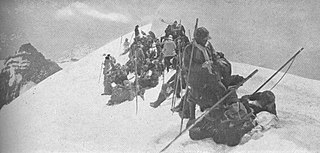
The Mountaineers is an alpine club in the US state of Washington. Founded in 1906, it is organized as an outdoor recreation, education, and conservation 501(c)(3) nonprofit organization, and is based in Seattle, Washington. The club hosts a wide range of outdoor activities, primarily alpine mountain climbing and hikes. The club also hosts classes, training courses, and social events.
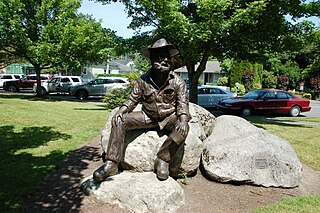
Harvey Manning was a noted author of hiking guides and climbing textbooks, and a tireless hiking advocate. Manning lived on Cougar Mountain, within the city limits of Bellevue, Washington, calling his home the "200-meter hut". His book Walking the Beach to Bellingham is an autobiography and manifesto fleshing out his journal of a hike along the shore of Puget Sound over a two-year span.

The Appalachian Trail Conservancy is a nonprofit organization dedicated to the conservation of the Appalachian Trail, a route in the eastern United States that runs from Maine to Georgia. Founded in 1925, the ATC is responsible for the day-to-day management of the Appalachian Trail under a cooperative agreement executed with the National Park Service. It is the lead non-governmental organization in protecting the trail's 2,193 miles (3,529 km), 250,000-acre (1,000 km²) greenway and coordinates the work of some thirty-one Appalachian Trail maintenance clubs, performing almost all of the on-the-ground maintenance work. The National Trails System Act, which established the National Trails System and brought the Appalachian Trail into the federal estate, enabled the trail to be managed as it had been since 1925, with central agency and NGO (ATC) coordination, but most trail work being performed by, in 2019, almost 6,000 volunteers.

The Alpine Club of Canada (ACC) is an amateur athletic association with its national office in Canmore, Alberta that has been a focal point for Canadian mountaineering since its founding in 1906. The club was co-founded by Arthur Oliver Wheeler, who served as its first president, and Elizabeth Parker, a journalist for the Manitoba Free Press. Byron Harmon, whose 6500+ photographs of the Canadian Rockies in the early 20th century provide the best glimpse of the area at that time, was official photographer to the club at its founding. The club is the leading organization in Canada devoted to climbing, mountain culture, and issues related to alpine pursuits and ecology. It is also the Canadian regulatory organization for climbing competition, sanctioning local, regional and national events, and assembling, coaching and supporting the national team.

The Pacific Northwest Trail (PNT) is a 1,200-mile (1,900 km) hiking trail running from the Continental Divide in Montana to the Pacific Ocean on Washington's Olympic Coast. Along the way, the PNT crosses three national parks, seven national forests, and two other national scenic trails. It travels against the grain of several mountain ranges, including the Continental Divide, Whitefish Divide, Purcells, Selkirks, Kettles, Cascades, and Olympics. It was designated as the Pacific Northwest National Scenic Trail by Congress in 2009.
Ira Spring (1918–2003) was an American photographer, author, mountaineer and hiking advocate. He was the photographer and co-author, with Harvey Manning and his brother Bob Spring, of the "100 Hikes" series of books published by The Mountaineers. He co-founded the trails advocacy and maintenance organization Washington Trails Association (WTA) along with fellow trails advocate Louise Marshall. In 1998 he published an autobiography entitled "An Ice Axe, a Camera, and a jar of Peanut Butter" detailing his long photographic career on several continents. In recognition of this work in conservation and wilderness-preservation, he was presented with the Roosevelt Conservation Award by President George H. W. Bush in 1992. Spring was born in Jamestown, New York with a twin, Bob, and grew up in Shelton, Washington. He was an army aerial photographer in World War II. He died on June 5, 2003, in Edmonds, Washington of prostate cancer.
Poudre Wilderness Volunteers (PWV) is a volunteer group that assists the Canyon Lakes Ranger District of the US Forest Service (USFS). Poudre Wilderness Volunteers recruits and trains volunteers to serve as wilderness rangers and hosts for the purpose of educating the public and providing other support to the USFS.

Sarah Margaret "Sally" Roffey Jewell is a British-American business executive and environmentalist who served as the 51st United States secretary of the interior in the Obama administration from 2013 to 2017.
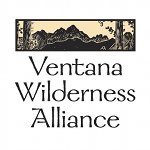
The Ventana Wilderness Alliance, founded in 1998, is a 501 c 3 nonprofit organization dedicated to protecting the of California's Big Sur backcountry. Its mission is to protect, preserve, and restore the wilderness qualities and biodiversity of the public lands within California's Northern Santa Lucia Mountains and Big Sur region.
James Edwards Mills is an African American freelance journalist, author, outdoor guide, and independent media producer who specializes in telling stories about outdoor recreation, environmental conservation, and sustainable living.
The Pacific Crest Trail Association (PCTA) is a nonprofit organization dedicated to the conservation and management of the Pacific Crest National Scenic Trail, a 2,650-mile hiking and equestrian trail in the western United States that runs through California, Oregon, and Washington. The southern terminus is in Campo, California at the Mexican border approximately 50 miles east of San Diego. The northern terminus is at the US–Canadian border at E.C. Manning Provincial Park, which lies just north of the border between Washington and British Columbia.
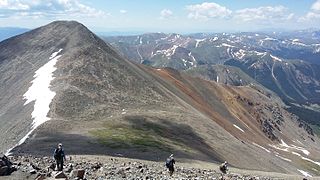
The Continental Divide Trail Coalition (CDTC) is a Colorado-based organization that works to complete, promote, and protect the Continental Divide National Scenic Trail. The CDT is used by hikers, equestrians, and mountain bikers, and runs approximately 3,000-miles along the Continental Divide from Mexico to Canada. The trail crosses five states: New Mexico, Colorado, Wyoming, Idaho, and Montana, and is considered one of the three Triple Crown of Hiking trails in the United States.















